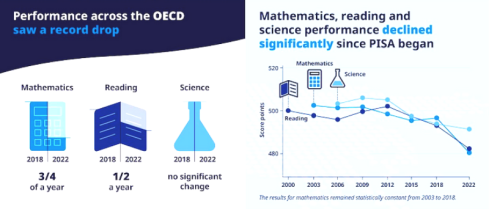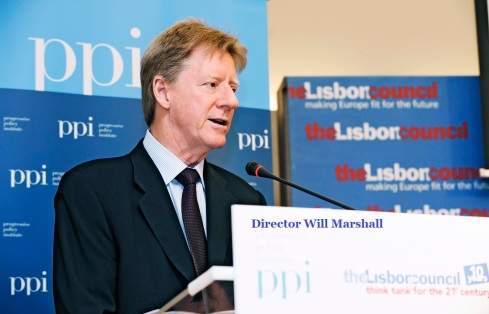By Thomas Ultican 2/20/2024
February began with Progressive Policy Institute and The 74 teaming up for a Webinar on PISA math test results, declaring “Historically Underperforming PISA Scores are a Call to Action”.
Dr. Yong Zhao, Foundation Distinguished Professor of Education at University of Kansas and among his many accolades, an appointed Professor of Educational Leadership at University of Melbourne, has a different view, stating:
“Since 2000, our scores on PISA have barely changed. While there’s much chatter about learning from other systems, it has not happened. There is no reason that the U.S. should continue its participation in PISA.”
Zhao sees standardized testing as undermining student creativity. PISA tests stress cognitive skills while noncognitive skills are more related to creativity and entrepreneurship. His book, Who’s Afraid of the Big Bad Dragon, describes how in 605 AD the Chinese government developed a testing system known as “keju” to select people for prestigious government positions. That system is now blamed for stifling creativity and scientific development. When westerners showed up in their ships, guided by compasses and using gunpowder, both invented in china, the Chinese could not defend themselves. Zhao writes, “In fact, the keju system has been held responsible for the decline of the Chinese empire.” (Big Bad Dragon page 35)
PISA 2022 Testing Results
A quick peek at PISA’s data presentation reveals average scores in everything have gone the wrong direction since bankers from the Organization of Economic Co-operation and Development (OECD) got involved. Furthermore, their baseless use of translating test scores into time is fraudulent.
Why would anyone pay attention to their views on education?
Progressive Policy Institute
Going into the 1984 Democratic convention, several politicians, not happy with the party’s direction, met in a San Francisco hotel room but did not take action. After Walter Mondale’s thumping by Ronald Reagan, the Democratic Leadership Council (DLC) was created based on a plan developed by Al From who believed that being independent from the Democratic Party would allow them to be more “entrepreneurial”. Current PPI Director, Will Marshall, was hired to be policy director (Left Behind Pages 43-45).
To drive their policy strategy, From and Marshall decided to establish a think tank. Seeing the way Heritage Foundation, American Enterprise Institute and Cato Institute had driven the conservative revolution in the 1970s and 1980s, they created a new idea-generating center called Progressive Policy Institute (PPI) (Left Behind Pages 112-113).
Early on, PPI came out with articles opposing minimum wages which many people saw as anti-union. Later, a PPI fellow, David Osborne, famously campaigned for an entrepreneurial government to meld public and private to maximize productivity and effectiveness. Lily Geismer said, “Osborne developed these ideas into a book cowritten with Ted Gaebler, called Reinventing Government: How the Entrepreneurial Spirit Is Transforming the Public Sector; which was released in 1992” (Left Behind Page 117).
Geismer continued:
“Under Osborne’s guidance, the DLC became one of the first political organizations to explore charter schools as a means of improving public education. Charters, along with the other programs, became a critical part of the new approach that DLC promised it would provide as the nation was starting a new decade.” (Left Behind Page 118)
It is no surprise to see PPI joining with The 74 to trash public education. Their “third way” agenda has a lot in common with the GOP driven school choice and anti-labor agenda.
For this Webinar, the PPI expert panel included Dr. Peggy G. Carr, Commissioner of the National Center for Education Statistics (NCES) in the U.S. Department of Education, Andreas Schleicher, Director of the Directorate of Education and Skills at the OECD and Jonathan A. Supovitz, Professor in charge of Organizations, Leadership, and Systems Division at University of Pennsylvania, Graduate School of Education. The moderator was PPI’s Tressa Pankovits, Co-Director of Reinventing America’s Schools.
Peggy Carr served in NCES for more than 20 years before Biden appointed her Commissioner. She is undoubtedly a gifted mathematician but knows little about America’s classrooms. Carr recently made headlines when the charter school she founded, Children’s Village Academy in North Carolina, was charged with paying exorbitant interest rates on a 15-year old loan she gave the school.
Andreas Schleicher is a fine mathematician but, just like Peggy Carr, he knows nothing about good education. His personal PISA involvement blinds him to how little value standardized testing is for evaluating student learning.
I really don’t want to say anything mean about moderator Tressa Pankovits because she is a fellow Aztec, unfortunately her resume reveals no training or experience as an educator. Still she is PPI’s “Co-Director of Reinventing America’s Schools, which researches innovations needed to create a 21st century model for public education that is geared to the knowledge economy.” It is hard to understand how her background qualifies for the position. Before she got this job she worked 10 years for Paul Vallas who hurt public schools in Chicago, Philadelphia, New Orleans and Bridgeport. He also has no training or experience as an educator.
The only educator in this group is Jonathan A. Supovitz. His values look shaky, based on the company he keeps.
PISA and the OECD
OECD was formed in 1961 as a follow-on to the Marshall plan, run by bankers and economists. Market Business states:
“All OECD member states claim to be market economies that are committed to democracy. The organization says it provides a platform where they:
- Share and compare policy experiences.
- Identify good practices.
- Coordinate members’ international and domestic policies.
- Seek answers to common problems.”
In 2014, German writers, Sija Graupe and Jochen Krautz, wrote “From Yardstick to Hegemony”, using OECD documents:
“The OECD Conference documentation of 1961 declares unequivocally: ‘It goes without saying that the educational system must be an aggregate of the economy, it is just as necessary to prepare people for the economy as real assets and machines. The educational system is now equal to highways, steel works and chemical fertilizers’”.
“What this unrealistic worldview setting in turn impedes is any critique or will to change because rather than being understood by the public as a theoretical construct it is, according to the neoliberal economist August Hayek, accepted by most as an immediately evident truth. Whether they are true or false, economic theories and all assessments based on these (such as PISA) determine reality. … As long as people believe having more PISA points is better than less in order to be successful economically they will, of course, do everything they can to acquire more. Education is then forced to uncritically yield to the pressure of comparative assessment, even if it is based on pure assertion.”
The meaningfulness of PISA testing results are pure assertion based on bad science.
Noel Wilson’s famous 1997 peer-reviewed thesis, “Educational Standards and the Problem of Error” fundamentally states the error involved in educational testing is so great that validity is compromised. In other words, standardized tests are not refined enough to make more than generalizations and are bunk for measuring learning or teaching.
Yong Zhao shared research showing an inverse relationship between test scores and economic development:
“In fact, a correlational analysis done in 2007 showed a negative correlation between international test scores and economic development (Baker, 2007). That is, countries with higher scores in the first international study did worse than countries with lower scores.”
Because America does not filter students from the academic system before high school, tested populations do not compare well internationally. However, since 2010, in the yearly International Math Olympiad, the USA team has come in first four times and never finished lower than fourth … out of over 100 entrants.
So why are we still bothering with meaningless PISA exams???



